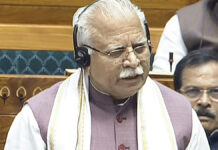In a heartening display of humanity, Minister for Food, Transport, and Information, Satish Sharma, recently set an example that resonated across Srinagar. While traveling through the city, he encountered an accident where two people were severely injured. Instead of merely observing or waiting for emergency services, Mr. Sharma took immediate action. He personally transported the victims to a nearby hospital, ensuring they received the urgent medical care that ultimately saved their lives. This act of kindness and responsibility is a powerful reminder of how timely intervention can make a world of difference.In today’s fast-paced society, it is unfortunate but true that many individuals tend to avoid assisting accident victims, often out of fear of getting entangled in legal complications or police investigations. This reluctance stems from a lack of awareness about the Good Samaritan laws that protect those who come forward to help. The concern over being questioned by authorities or even facing legal hassles has led to a troubling trend where accident victims are left unattended on busy streets, struggling between life and death. Minister Sharma’s actions defied this narrative and emphasized that humanity should come first, beyond any legal worries.By personally escorting the injured to the hospital, Mr. Sharma not only ensured they received timely treatment but also sent a message that helping others in distress is a moral obligation. His intervention exemplifies how public figures, especially those in leadership positions, can lead by example. It is moments like these that remind us of the positive role leaders can play, not just in policymaking but also in setting behavioral standards for society.Furthermore, Mr. Sharma’s efforts highlight a crucial aspect of road safety and emergency response: the importance of timely assistance. According to health experts, the first hour after an accident, often referred to as the “golden hour,” is critical. Quick medical intervention during this period can significantly improve the chances of survival for victims. Had the minister not acted swiftly, the outcome for the accident victims could have been far more tragic. As citizens, we should all be inspired by this act. The Good Samaritan law exists precisely to encourage people to assist those in need without fear of legal repercussions. It is essential to spread awareness about such laws so that more individuals are willing to step forward and offer help during emergencies. In a society where compassion and empathy often take a back seat, Mr. Sharma’s gesture is a shining beacon of hope. It exemplifies responsible citizenship and true leadership. If more people, especially those in influential positions, follow this path, it could pave the way for a more empathetic and caring society where helping others is seen as a duty rather than a risk. Mr. Sharma’s act should serve as a call to action, urging everyone to recognize the importance of humanity and selflessness, especially in times of crisis.

Dogra Herald is the media of J & K, breaking language and geographical barriers, connecting J & K to the rest of India.
0191 245 4946
info@dograherald.com
Latest articles
President, Vice-Prez pay homage to Dr BR Ambedkar on his 64th Mahaparinirvan Diwas
iamjkstarr - 0
President Ram Nath Kovind led the nation in paying tributes to Bharat Ratna Dr BR Ambedkar on his 64th Mahaparinirvan Diwas today. He paid...
J&K registers record daily jump of 2,204 COVID-19 cases
iamjkstarr - 0
SRINAGAR: Jammu and Kashmir on Wednesday recorded its sharpest single-day spike of 2,204 COVID-19 cases that pushed the union territory''s cumulative tally...
PSA of 36 revoked, 16 released
iamjkstarr - 0
Government on Monday revoked Public Safety Act (PSA) detention orders of 36 persons lodged in different jails of Jammu and Kashmir and released 16...




























